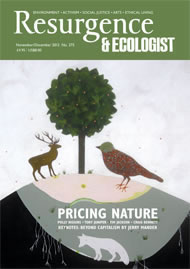This book describes how the money system fails to serve the wellbeing of most of the world’s people, and motivates both rich and poor to destroy other life on the planet on which our own survival depends. Moreover, the system is now breaking down.
A vital reform is to change the way we create money, which is usually created by governments as coins and notes. But it can also of course be created by communities. However, the main creators of money are banks, which create 97% of the UK money supply as debt.
James Robertson argues convincingly that this largely unknown fact is the core underlying cause of the global financial crisis and that until money can be put on a debt-free foundation, the problems of boom and bust will continue. Moreover, the prospect of an ecological economy will remain blocked because compounding interest drives the need for growth.
Seigniorage is the ancient right of rulers to hold an exclusive monopoly in the issuing of money. The profit margin between the cost of producing coins and bank notes and their monetary value has been a good earner for monarchs and governments and this remains so for the 3% of publicly produced money. But how did the banks displace the government and take over that lucrative monopoly?
The historic change began in 1694, when King William III needed funds for his war with Louis XIV of France. Parliament would not let him raise taxes further, so William Paterson set up the Bank of England as a private bank to lend him the money. We have become increasingly indebted nationally since.
Banking grew out of the goldsmith trade where initial loans were of precious metals. The IOUs issued by goldsmiths for the safekeeping of precious metals circulated increasingly as the early form of paper money. This innovation was efficient and goldsmiths noted that they could issue more IOUs than commodities held and lend just the paper. This was the origin of fractional reserve banking, the creation of money out of thin air as debt.
As with Northern Rock, bank runs periodically reveal the cupboard to be bare, and increasing bankruptcies led to the Bank Charter Act of 1844, which removed from banks the power to produce paper money, transferring this right to the government. Unfortunately, fractional reserve banking was not banned then and the banks simply developed cheque accounts as a new form of promissory note. Thus, passing relatively unnoticed, the bank creation of money as debt has grown inexorably for decades.
In the 1920s C.H. Douglas and Frederick Soddy pushed for an end to the power of banks to create debt money. Soddy called for 100% money, whereby banks could only lend from their deposit base – the practice that economists and the public erroneously assume is the case today. Douglas called for Social Credit, a form of Citizen’s Income.
In a report for new economics foundation in 2000, Robertson and German economist Joseph Huber revived these forgotten arguments for debt-free money. Robertson’s book makes the case compellingly and spells out the combined financial, social and ecological benefits.
UK government debt was £300 billion in 2001. In bailing out the banks, national debt rose to £600 billion in 2008 and is now over £1 trillion. The interest payments alone were £43 billion in 2011, far higher than the national education budget of £33 billion and not far below the £58 billion spent on welfare.
Government can readily create money electronically. Quantitative easing has injected £375 billion into the economy, interest-free, since 2009. Robertson’s monetary reform plan calls on government to replace our debt-based money with a Citizen’s Income and remove from the banks their money-creation powers over a three-year transition period.
Robertson’s calculations reveal that this democratic nationalisation of the money supply would provide an ongoing annual saving of £75 billion for all citizens and a further one-off saving of £1,500 billion during the changeover from debt money to interest-free money. Money could become our servant, and debt no longer our master.






